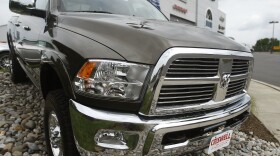The Obama administration filed a with the World Trade Organization this week alleging that China is illegally subsidizing its auto industry.
The US says China provides cheap loans and grants and other incentives to their car industry, and that these favors go to companies who are already successful exporters. That, says US Trade Representative Ron Kirk, is unfair.
"There are a set of rules and everybody's got to play by those rules, " says Kirk.
But wait a minute, didn't the US bail out our own auto industry? What's the difference?
Gary Hufbauer of the Peterson Institute says, for one, the alleged Chinese subsidies weren't done in a period of distress like our bailout.
"The Chinese have been highly successful, they're the top auto producer in the world," says Hufbauer.
Despite that difference, he says for most people:
"It looks pretty much like a duck. Duck walks, duck quacks, same duck."
And yet, the US auto bailout is not being challenged at the WTO. A national industry rescue rarely is.
According to Ambassador Kirk, that's because "everybody understands that was a short term issue and the auto industry is paying that money back."
Our bailout was not tied to export performance, as the US alleges China's subsidies are--a clear WTO violation. Still, it may have looked unfair to China. About a year ago, China slapped a tax on US car imports claiming that our cars had benefited from subsidies. This was, not coincidentally, says the US, not long after we'd put up a tariff that affected Chinese tires. The US is challenging this tax at the WTO.
You might think from this back and forth that these two just can't get along, but actually-- most of the time — trade goes smoothly.
"I know some people think 'Oh boy the US and China just sue each other all the time,' but 90 percent of our trade goes off every day without a hitch," says Kirk.
Copyright 2020 NPR. To see more, visit https://www.npr.org. 9(MDAxNDQ2NDAxMDEyNzU2NzM2ODA3ZGI1ZA001))





